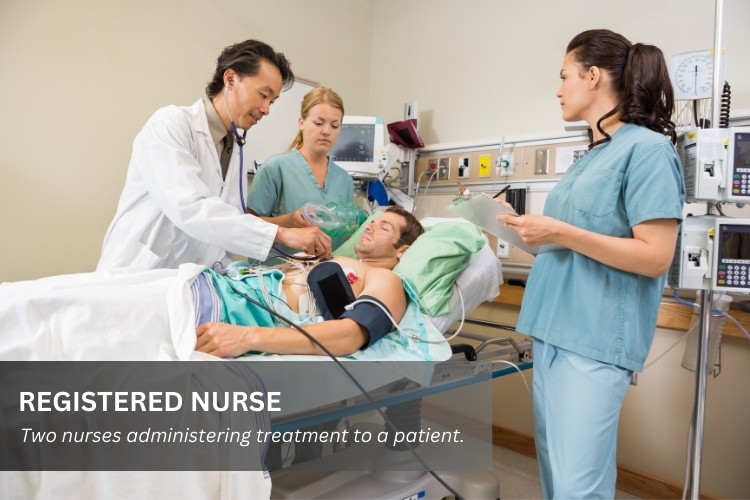Registered Nurse (RN) Career

Registered Nurses (RN) are essential members of the healthcare system, providing direct patient care, coordinating treatments, and supporting patient recovery. With a versatile skill set, RN work in nearly every healthcare setting, from hospitals and clinics to community health organizations, and they have the option to specialize in a wide range of fields. This career offers stability, advancement opportunities, and the chance to make a meaningful impact on patient outcomes. Let's take a closer look at the Registered Nurse role, explore where they work, review their education requirements, outline their duties, consider salary expectations, and highlight potential career paths for this nursing career.
Overview
What Is a Registered Nurse (RN)?
A Registered Nurse (RN) is a licensed healthcare professional responsible for providing direct patient care, administering medications, and coordinating treatment plans under the guidance of a physician or advanced practice nurse. Their responsibilities may include managing medical records, performing diagnostic tests, and supervising lower-level nursing staff. RN are essential to maintaining patient health, comfort, and safety while also serving as key communicators with families about care plans and progress.
Registered Nurse is the largest nursing role in healthcare. It also serves as the gateway to many advanced specialties and leadership positions. Many RN begin their careers as NA, PN, or VN and advance through continued education and bridge programs. This career path provides the strongest foundation for long-term growth, specialization, and professional impact in nursing. Since the education requirements are much more extensive for a Registered Nurse compared to a Nursing Assistant, Practical Nurse, or Vocational Nurse, RN are expected to perform a wider variety of duties and often train and supervise other nurses.
Education
How To Become a Registered Nurse (RN)
To become a Registered Nurse, candidates must complete an accredited nursing program at either the associate or bachelor's degree level. An Associate Degree in Nursing (ADN) typically takes about two years, while a Bachelor of Science in Nursing (BSN) usually takes around four years. Both options include classroom instruction and hands-on clinical experience to prepare students for the NCLEX-RN exam and professional nursing practice. The path you choose depends on your long-term career goals and how soon you would like to enter the workforce.
Follow these steps to become a Registered Nurse:
- Earn a Nursing Degree. Prospective RN must complete an accredited nursing program, which can be either an Associate Degree in Nursing (ADN) or a Bachelor of Science in Nursing (BSN).
- Pass the NCLEX-RN Exam. After graduating from a nursing program, candidates must pass the National Council Licensure Examination for Registered Nurses (NCLEX-RN) to become licensed.
- Obtain State Licensure. Once the NCLEX-RN is passed, candidates must apply for licensure in the state where they plan to work. Each state may have additional requirements, such as background checks or documentation.
- Gain Clinical Experience. Most nursing programs include clinical rotations, but newly licensed RN may also pursue internships or entry-level roles to build experience in their preferred nursing specialty.
How long does it take to become a Registered Nurse? On average, it takes about two to four years to become a Registered Nurse, depending on the educational path chosen. An Associate Degree in Nursing (ADN) generally takes two years to complete, while a Bachelor of Science in Nursing (BSN) takes approximately four years. After graduation, students must pass the NCLEX-RN, which may require a few additional months of preparation.

Average Salary
How Much Does a Registered Nurse Make?
Registered Nurses are among the most in-demand healthcare professionals in the United States and earn strong salaries that reflect their training and responsibility. On average, a Registered Nurse can expect to earn between $62,000 and $120,000 annually, depending on experience, specialization, and work setting. Those with advanced degrees or certifications may earn even more.
Average annual salary for a Registered Nurse:
- Entry-level: $62,000 - $72,000 per year.
- Mid-career: $72,000 - $90,000 per year.
- Experienced: $90,000 - $120,000 per year.
The latest salary report from the U.S. Bureau of Labor Statistics (BLS) shows that the median annual wage for Registered Nurses is $81,220. The average hourly wage is $39.05. Wages range from $29.96 per hour for the lowest 10% to $58.03 per hour for the highest 10%. This equates to a full-time annual salary range of approximately $62,000 to $120,000. Registered Nurses working in hospital settings or ambulatory care tend to earn more, while those employed in geriatric nursing or home health nursing may earn slightly less.
Registered Nurses with bachelor's degrees have many paths for increasing their salary. Through experience, taking on supervisory roles, specialized training, and graduate-level education, RNs can move into leadership positions, teach in nursing programs, or pursue more independent Nurse Practitioner (NP) roles. RN to BSN bridge programs and RN to MSN bridge programs are available for those who want to continue their education.
Job Duties
What Does a Registered Nurse Do?
Registered Nurses are responsible for a wide range of job duties that involve both clinical and administrative tasks. They provide direct patient care, monitor health status, and coordinate treatment plans in collaboration with physicians and other healthcare professionals. RN serve as the central point of communication between patients, families, and the broader medical team, ensuring that care is delivered safely and effectively.
The most common job duties of a Registered Nurse:
- Administering Medications. Dispense prescribed medications, monitor for side effects, and ensure accurate dosage and timing across shifts.
- Performing Patient Assessments. Conduct physical assessments, evaluate symptoms, and monitor changes in patient conditions to guide medical decisions.
- Coordinating Care Plans. Collaborate with physicians and specialists to develop care plans, adjusting treatment as needed based on patient response.
- Supervising Nursing Staff. Provide guidance to Practical Nurses (PN), Vocational Nurses (VN), and Nursing Assistants (NA), ensuring that delegated tasks align with the patient's care goals.
- Maintaining Medical Records. Document patient histories, treatments, test results, and care progress using electronic health records (EHR) systems.
- Performing Clinical Procedures. Start and manage IV lines, assist with wound care, prepare patients for tests or surgeries, and interpret basic diagnostic results.
- Educating and Supporting Patients. Teach patients and caregivers about medications, follow-up care, chronic condition management, and preventive health practices.
RN work in fast-paced environments that may include hospitals, surgical centers, outpatient clinics, or specialty units such as oncology, cardiology, and pediatrics. Shifts can vary widely and often include nights, weekends, and holidays. The role requires strong communication skills, clinical judgment, and the ability to prioritize tasks in high-pressure settings.

Essential Skills
What Skills Does a Registered Nurse Need?
Registered Nurses are expected to think critically, respond quickly, and manage multiple priorities. Their role requires a combination of technical knowledge and strong communication across care teams and patient families. Here are some of the skills a Registered Nurse needs to succeed:
- Clinical judgment. Assess symptoms, evaluate treatments, and make timely decisions.
- Patient advocacy. Ensure patients understand their care plans and receive appropriate treatment.
- Multitasking. Coordinate care for several patients while handling documentation and team communication.
- Leadership. Supervise Practical Nurses and Nursing Assistants while maintaining patient flow.
- Stress management. Work efficiently in fast-paced environments, including ER or ICU settings.
- Technology fluency. Operate electronic health record systems and use modern medical equipment.
Registered Nurses often work long shifts and manage patients with complex conditions. The role can be stressful, especially during emergencies or staffing shortages. However, it also offers a strong sense of purpose for those who thrive in dynamic, patient-centered environments.
Work Environment
Where Does a Registered Nurse Work?
Registered Nurses have the flexibility to work in many different healthcare environments depending on their specialty and career goals. The majority of registered nurses work at hospitals. However, RN are essential in other workplaces, such as clinics and long-term care facilities. The most common workplaces for a Registered Nurse include:
- Hospitals. RN provide patient care in various departments such as Emergency Room (ER), Intensive Care Unit (ICU), Cardiac Care Unit (CCU), Obstetrics and Gynecology, Operating Room (OR), and Outpatient. They monitor patients, administer treatments, and collaborate with doctors and other nurses.
- Clinics. RN in clinics assist with routine procedures, patient education, and preventive care. They may work in outpatient centers or private practices.
- Nursing Homes. RN working in long-term care facilities help manage chronic conditions for elderly or disabled patients, providing ongoing care and monitoring.
- Home Health Care. RN may visit patients at home to provide treatment and monitor their condition, particularly for those recovering from surgery or managing chronic illnesses.
- Ambulatory Care. RN in ambulatory care provide care for patients in outpatient settings, often assisting with minor procedures, chronic disease management, and patient education without requiring overnight stays.
RN are versatile professionals who adapt to different environments to meet the needs of their patients. They work in both fast-paced hospital settings, outpatient ambulatory care centers, and more personalized home care environments.
Last updated: August 16, 2025
References:
- Registered Nurses. Bureau of Labor Statistics, U.S. Department of Labor. Occupational Outlook Handbook. Retrieved August 16, 2025.
- NCLEX Nurse Licensure Exam. National Council of State Boards of Nursing (NCSBN). Retrieved August 16, 2025.
- Registered Nurse. California Board of Nursing, Licensing and Renewals. Retrieved August 16, 2025.
- Registered Nurse. New York Board of Nursing, Licensing and Renewals. Retrieved August 16, 2025.
- Registered Nurse. Virginia Board of Nursing, Licensing and Renewals. Retrieved August 16, 2025.
- Registered Nurse Job Description: Top Duties and Qualifications. Indeed for Employers. Retrieved August 16, 2025.
- Registered Nurse (RN), Level 1 Salary in the United States. Salary.com. Retrieved August 16, 2025.
- Career Profile: Registered Nurse. Cambridge College of Healthcare and Technology. Retrieved August 16, 2025.
- What are some careers in health science?. CareerOneStop, U.S. Department of Labor, Employment and Training Administration. Retrieved August 16, 2025.
- Registered Nurse Career Profile. State of California, Employment Development Department, Career Profile. Retrieved August 16, 2025.
- Nursing Careers: Getting Started. American Nurses Association, Career Profile. Retrieved August 16, 2025.


